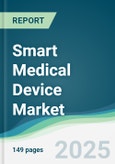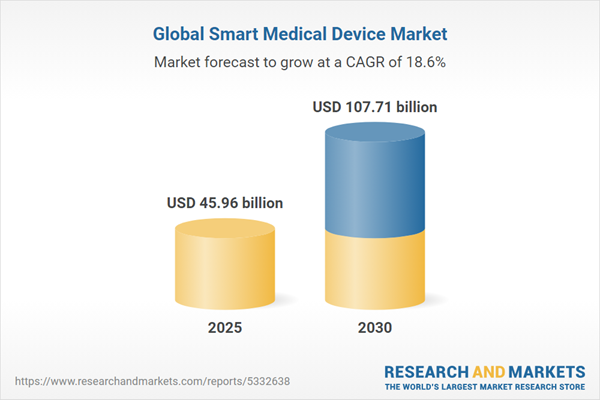The global smart medical devices market is experiencing robust growth from 2025 to 2030, driven by increasing demand for wireless and smartphone-compatible medical equipment, technological advancements, and heightened consumer awareness of health and fitness. These devices, including wearable sensors, ECG monitors, and smartwatches with fitness trackers, enable users to monitor vital signs conveniently without frequent clinic visits. The market is further propelled by the rising prevalence of chronic diseases and the growing elderly population, particularly in developed regions. In India, government initiatives and increasing healthcare expenditure are fostering market expansion.
Market Drivers
Rising Prevalence of Chronic Diseases
The increasing incidence of chronic diseases, such as diabetes, cardiovascular conditions, and respiratory disorders, is a primary driver of the smart medical devices market. These conditions require continuous monitoring and management, which smart devices facilitate through real-time tracking of health metrics. By enabling patients to adhere to treatment plans and detect early warning signs, these devices support efficient disease management and reduce healthcare burdens, particularly for aging populations transitioning from hospital to home care.Growth in India
The smart medical devices market in India is projected to grow steadily, driven by rising healthcare expenditure and government initiatives promoting technology adoption. India's public healthcare spending has increased, supporting the development and accessibility of advanced medical technologies. The growing demand for specialized devices, such as those for diabetes and cardiovascular monitoring, is fueled by the country's rising chronic disease burden and improving healthcare infrastructure.Government Initiatives in India
Indian government programs, such as the Make in India initiative and the National Digital Health Mission (NDHM), are significantly boosting the smart medical devices market. These initiatives enhance domestic manufacturing capabilities and strengthen digital infrastructure, facilitating the integration of smart devices into healthcare systems. The NDHM leverages India's robust digital ecosystem, including Aadhaar, the JAM trinity (Jan Dhan-Aadhaar-Mobile), and Unified Payments Interface (UPI), to streamline healthcare delivery and improve access to smart medical technologies, particularly for remote monitoring and diagnostics.Consumer Awareness and Technological Advancements
Growing consumer awareness of health and fitness is driving demand for user-friendly smart medical devices that require minimal specialized knowledge. Devices like wearable sensors and smartwatches enable individuals to monitor vital signs, promoting proactive health management. Technological breakthroughs, such as improved connectivity and data analytics, enhance device functionality, making them indispensable for both patients and healthcare providers.Market Restraints
The smart medical devices market faces challenges due to the high cost of advanced devices, which can limit adoption in price-sensitive markets. Data privacy and security concerns also pose significant barriers, as consumers and regulators prioritize the protection of sensitive health information. Additionally, the need for reliable connectivity and interoperability with existing healthcare systems can complicate adoption, particularly in regions with underdeveloped digital infrastructure. Addressing these challenges through cost-effective solutions and robust cybersecurity measures will be critical for sustained market growth.Market Segmentation
By Product Type
The market includes wearable devices (e.g., smartwatches, fitness trackers), diagnostic devices (e.g., ECG monitors, glucose meters), and therapeutic devices. Wearables dominate due to their ease of use and growing consumer adoption for fitness and health monitoring.By End-User
The market serves hospitals, clinics, homecare settings, and individual consumers. Homecare settings are growing rapidly, driven by the elderly population's preference for aging-in-place solutions and the convenience of remote monitoring.By Geography
The market is segmented into North America, Europe, Asia-Pacific, South America, and the Middle East and Africa. North America and Europe lead due to their aging populations and advanced healthcare systems. Asia-Pacific, particularly India, is expected to grow steadily, driven by government initiatives and increasing healthcare expenditure. South America and the Middle East and Africa are emerging markets, supported by rising health awareness.The smart medical devices market is set for robust growth from 2025 to 2030, driven by chronic disease prevalence, consumer health awareness, and government initiatives, particularly in India. Despite challenges from high costs and data privacy concerns, the market's outlook remains positive, with strong growth in North America, Europe, and Asia-Pacific. Industry players must focus on affordability, security, and interoperability to capitalize on the growing demand for smart medical devices.
Key Benefits of this Report:
- Insightful Analysis: Gain detailed market insights covering major as well as emerging geographical regions, focusing on customer segments, government policies and socio-economic factors, consumer preferences, industry verticals, and other sub-segments.
- Competitive Landscape: Understand the strategic maneuvers employed by key players globally to understand possible market penetration with the correct strategy.
- Market Drivers & Future Trends: Explore the dynamic factors and pivotal market trends and how they will shape future market developments.
- Actionable Recommendations: Utilize the insights to exercise strategic decisions to uncover new business streams and revenues in a dynamic environment.
- Caters to a Wide Audience: Beneficial and cost-effective for startups, research institutions, consultants, SMEs, and large enterprises.
What do businesses use our reports for?
Industry and Market Insights, Opportunity Assessment, Product Demand Forecasting, Market Entry Strategy, Geographical Expansion, Capital Investment Decisions, Regulatory Framework & Implications, New Product Development, Competitive Intelligence.Report Coverage:
- Historical data from 2020 to 2024 & forecast data from 2025 to 2030
- Growth Opportunities, Challenges, Supply Chain Outlook, Regulatory Framework, and Trend Analysis
- Competitive Positioning, Strategies, and Market Share Analysis
- Revenue Growth and Forecast Assessment of segments and regions including countries
- Company Profiling: Strategies, Products, Financial Information, and Key Developments among others
Segmentation:
Global Smart Medical Devices Market Segmentation
By Type
- Diagnostics & Monitoring Devices
- Therapeutics Devices
- Others
By Application
- Cardiovascular
- Neurology
- Respiratory
- Others
By End-User
- Hospitals & Clinics
- Ambulatory Surgical Centers (ASC)
- Homecare Settings
By Geography
- North America
- United States
- Canada
- Mexico
- South America
- Brazil
- Argentina
- Others
- Europe
- United Kingdom
- Germany
- France
- Spain
- Others
- Middle East and Africa
- Saudi Arabia
- Israel
- Others
- Asia Pacific
- Japan
- China
- India
- South Korea
- Others
Table of Contents
Companies Mentioned
- Boston Scientific Corporation
- ViVO Smart Medical Devices Ltd
- Dexcom Inc
- Abbott Laboratories
- Medtronic Plc.
- NeuroMetrix, Inc.
- Omron Healthcare, Inc.
- Koninklijke Philips N.V.,
- F. Hoffmann-La Roche Ltd
- DuPont
Table Information
| Report Attribute | Details |
|---|---|
| No. of Pages | 149 |
| Published | August 2025 |
| Forecast Period | 2025 - 2030 |
| Estimated Market Value ( USD | $ 45.96 billion |
| Forecasted Market Value ( USD | $ 107.71 billion |
| Compound Annual Growth Rate | 18.5% |
| Regions Covered | Global |
| No. of Companies Mentioned | 10 |









